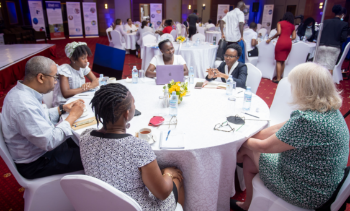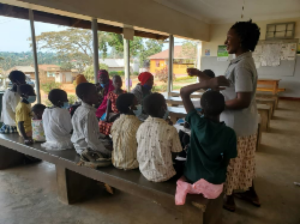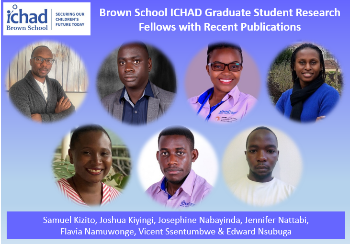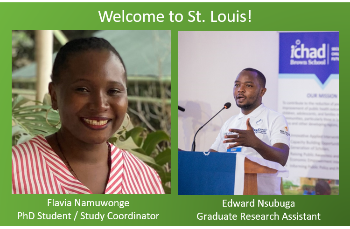|
|

|
August 2022 | ICHAD & SMART Africa Monthly Monitor
|
|
|
|
|
|
Summer Wrap Up and a Look Ahead
|
Heading into the new academic year at the Brown School, we reflect on our busy and productive summer. After the successful Forum on Child and Adolescent Global Health Research and Capacity Building in Uganda and the Community Research Immersion experience in St. Louis earlier in the summer, Dr. Fred Ssewamala traveled back to Uganda to give the keynote address at a gathering of key stakeholders and top officials in child and adolescent well-being at the National Dissemination of the National Child-Focused Research Agenda and the Launch of the Knowledge Hub in Uganda. In addition, we facilitated and wrapped up the intensive summer research training season with final presentations and a mock study review with trainees from our four NIH-funded research training programs (ACHIEVE, CHILD-GRF, LEAD, and RRT). Our research activities progressed, and our team published numerous papers.
Looking ahead, we are excited to start this season’s ICHAD Speaker Series featuring Dr. Leyla Karimli from UCLA, Dr. John Neslund from Harvard School of Medicine, and Dr. Proscovia Nabunya from Washington University in St. Louis. Members of our team will be busy starting up several new studies. We are recruiting global research trainees for the next cohort of the ACHIEVE global research training program (FIC Global Health Fellows/LAUNCH), and we are seeking a strong dissemination and communications coordinator to join the ICHAD US team at Washington University in St. Louis. As always, we welcome and appreciate your participation and collaboration!
In partnership,
The ICHAD and SMART Africa Teams
|
|
|
Fred Ssewamala Delivers Keynote Address at National Dissemination of the National Child-Focused Research Agenda and the Launch of the Knowledge Hub in Uganda
|

|
Fred Ssewamala, Founding Director of ICHAD
|
In July, key officials and stakeholders dedicated to health, education, and well-being of children and youth in Uganda gathered for the National Dissemination of the National Child-Focused Research Agenda and the Launch of the Knowledge Hub inthe Uganda. The National Child Focused Research Agenda 2022-2026 is the result of collaboration between the Ministry of Gender, Labour and Social Development and AfriChild Centre at Makerere University. The purpose of the research agenda is to provide a framework and guiding principles to agencies, groups, and institutions conducting child-centered research aimed at advancing survival, development, protection, and participation of all children in Uganda. The research agenda is designed to be used across sectors of health and education systems and structures, and to ensure the coordination of research efforts.
The keynote address was delivered by ICHAD Director Fred Ssewamala, who drew upon his experience growing up as an orphan in Uganda. He shared that his childhood inspired him to dedicate his life’s work to understanding and alleviating the causes of poverty and related poor health and mental health outcomes among children in his country of origin. He spoke to the audience of government officials, university leaders, academic researchers, non-governmental organization leaders, and other advocates for child well-being about the issues faced by children in poverty in Uganda. He drew attention to the links between poverty and a host of health and developmental adverse outcomes and guided the audience through his approach to economic strengthening intervention research. Dr. Ssewamala also shared statistics illustrating the low percentage of funded research being conducted and published by researchers from Sub-Saharan Africa. He concluded with a call to the colleagues in the room to make a concerted effort to foster the development and capacity of the next generation of child and adolescent health researchers in Uganda and Sub-Saharan Africa.
Dr. Ssewamala’s speech inspired a sense of urgency and instilled a new approach to addressing ongoing challenges for children and families in Uganda.
|
“"Honestly speaking, all of us from all the Government Sectors were thrilled by the practical and very touching presentation that [Dr. Ssewamala] delivered. It brought the real practical issues that practically impact on children in Uganda that eventually derail them from excelling. Sincerely speaking, [his] presentation has since changed me. I now look at things from a totally different angle, my outlook is now beyond the Policies and Strategies that we put in place but the community and household interventions that directly benefit the vulnerable children and their caregivers.”
--Lydia Wasala Najjemba, Principal Probation Officer,
Department of Children and Youth Affairs, Uganda Ministry of Health
|
|
|
Highlights from ICHAD Summer Research Training
|

|
RRT fellows gather with Dr. Mary McKay at the Forum on Child and Adolescent Global Health Research and Capacity Building in Kampala, Uganda in June
|
The ten weeks from June 1 to August 5 may be the fastest in the calendar year, or it certainly seemed so during the 2022 Intensive Summer Training Season with ICHAD and our implementing partners. ICHAD’s four training programs -- ACHIEVE, CHILD-GRF, LEAD, and RRT -- kicked off the summer training curriculum in June virtually. Then the 40 trainees gathered for in-person learning and research site visits in Kampala and Masaka, Uganda, and St. Louis, Missouri, US. (For details on the Forum on Child and Adolescent Global Health Research and Capacity Building and the St. Louis Community Research Immersion, see the June/July newsletter.) In July, trainees worked on their research projects with mentors. They also met virtually for weekly peer-led sessions, during which trainees took turns volunteering to lead a trainees-only discussion about topics related to their research, resilience in their careers, and other topics they identified as pertinent to early career researchers.
In the final week, trainees from all four programs presented final summer presentations. During this culminating week of the Summer Training Session, the fellows presented on the work they accomplished throughout the summer, proposals developed, and plans for next steps. CHILD-GRF Cohort 2 Fellows participated in a NIH-style mock review session on their pilot award proposals, with review committees comprised of their colleagues from across all four programs as well as program leadership. This exercise gave trainees and reviewers the unique experience of assessing work based upon NIH guidelines and scoring systems, as well as the opportunity to give and receive constructive critiques. CHILD-GRF Cohort 2 fellows will now make adjustments and prepare to move forward with their projects. T37 LEAD trainees shared the projects they had collaborated with their mentors on over the summer and laid out plans for publications, presentations, and further collaborations. RRT trainees shared their experiences in engaging with their mentors and their plans for the remainder of their training year ahead. Finally, ACHIEVE trainees presented their research plans for the year ahead, and soon will be moving to their research sites in Sub-Saharan Africa and the US to begin the hands-on portion of their program. With a wide variety of topics from assets ownership of women who engage in sex work to the relationship of mothers with adolescent sons to deafness in newborns, we look forward to the critical work to come from these dynamic groups of trainees.
|
"The warmth of the directors and the program team cannot be over emphasized. The trainees are all smart and will likely make it as academicians. But I appreciate the way I was treated as a young academician which gave me the confidence to continue actively pursuing the goal. I was really challenged and inspired. Thank you!"
-- ICHAD Research Trainee
|
As part of the culmination of the summer training session, trainees across all programs recognized their peers who took initiative to support and engage their fellow trainees during the summer session. Trainees selected Leadership Award recipients from within their respective training programs, as well as an Overall Leadership Award recipient from among all programs, providing trainees the chance to honor trainees from outside of their own program. Congratulations to the awardees!
Leadership Awards Recipients
• Dr. Harriet Ajilong, CHILD-GRF Cohort 1
• Dr. Raymond Atwebembere, CHILD-GRF Cohort 2
• Dr. Damalie Nalwanga, CHILD-GRF Cohort 3
• Ms. Montray Smith, LEAD
• Ms. Natasja Magorokosho, RRT
• Dr. Mamadu Baldeh, ACHIEVE
Overall Leadership Awards Recipients (Tie)
• Dr. Richard Mpango, CHILD-GRF Cohort 2
• Dr. Nhial Tutlam, LEAD & ACHIEVE
As the summer training events wrapped up, one trainee shared, "[I appreciate] the networking with a great number of people in different fields of work and research interests, at different levels of their careers and yet willing to work and offer help to anyone who approached them, the different mentors who are all so helpful. The mix of different people from different places and field enriched the whole experience."
ICHAD is thankful to the trainees, mentors, co-leaders, and staff for the support and assistance during our 10-week training session. We are thrilled to have worked with such an outstanding group of early-career researchers and professionals in the field of global health, child and adolescent mental health, and HIV. We hope to continue to foster networking and future collaborations among trainees, and to further expand the opportunities for South-to-South and South-to-North collaboration.
|
|
|
Research Spotlight: M-Suubi Study - Reducing Stigma and Improving Health Outcomes among Adolescents Living with HIV
|

|
Family members attending the M-Suubi MFG-HIVSR training led by peer parents
|
|
RESEARCH STUDIES
ANZANSI Family Program
Bridges-R2
Kyaterekera Project
mHealth Pilot
M-Suubi
Obuvumu
Say No to Stigma
Suubi+Adherence-R2
Suubi4Cancer
Suubi4Her
Suubi4STEM
Suubi4Stigma
Suubi4StrongerFamilies
SMART Africa Studies
TRAINING PROGRAMS
ACHIEVE
CHILD Global Research Fellowship
LEAD Global Training Program
Researcher Resilience Training
|
|
|
UPCOMING EVENTS
September 27 | 12:30 pm CST
ICHAD Speaker Series: Economic strengthening interventions among female caregivers in Sub-Saharan Africa: underlying mechanisms of its effects with Leyla Karimli, PhD, Assistant Professor, UCLA Luskin School of Public Affairs
October 11 | 12:30 pm CST
ICHAD Speaker Series: Digital Innovations for Improving the Lives of People Living with Mental Illness Globally with John Naslund, PhD, Instructor of Global Health and Social Medicine, Harvard School of Medicine
November 2 | 12:00 pm CST
ICHAD Speaker Series in Collaboration with the Brown School's Public Health Speaker Series: Interventions to Address Stigma and Mental Health Challenges among Children and Families in Low Resource Settings: Implications for Public Health with Proscovia Nabunya, PhD, Assitant Professor, Brown School, Washington University in St. Louis; Co-Director of ICHAD
|
|
|
OTHER EVENTS, FUNDING & TRAINING OPPORTUNITIES
Call for Applications
ACHIEVE - One-Year Global Research Training Program
-Letters of Intent due October 1
-Eligibility:
- U.S. candidates: Medical doctors (MDs) and pre-doctoral (post-qualifying exams; medical school) and post-doctoral (PhD, ScD, etc.) trainees from diverse backgrounds in the U.S.
- Candidates from Sub-Saharan Africa: Post-professional degree graduates with six years of completing terminal degree (MBChB, MD, PhD, etc.) from 6 countries in Sub-Saharan Africa, (Ghana, Kenya, Rwanda, Sierra Leone, South Africa, Uganda).
- For full program and application information, click here.
Call for Applications
LEAD Global Training Program One-Year Postdoctoral Research Associate Position
- Postdocs or early career researchers with a commitment to global or domestic (US) health disparities research—especially mental health within resource constrained settings
- For full program and application information, click here.
LEAD Postdoctoral Associate in Perioperative Wellness
- Engage with the innovative Center for Perioperative Mental Health for mentored research centered on finding solutions to mental health needs of perioperative patients through patient-centered, individualized care
- For full program and application information, click here.
|
|
|
CALL FOR PAPERS
Global Social Welfare
International Journal of Environmental Research and Public Health
|
|
|
QUICK LINKS
Our Team
ICHAD News
SMART Africa News
SMART Africa/ICHAD Conference Videos
2022 Forum on Child and Adolescent Global Health Research and Capacity Building Report and Gallery
2021 ICHAD Annual Report
2021 Capacity Building Report
Capacity Buildng Connection
Publications
Donate
|
|
|

|
NOTABLES
Congratulations to the following trainees and alumni for their recent accomplishments!
|
|
|
Sonyia Richardson (RRT 2021) appeared as an expert guest on the US National Public Radio program, 1A.
|
Donte Bernard
(LEAD 2020), Leslie Adams (RRT 2020), Husain Lateef (RRT 2020, LEAD 2022), Enoch Azasu (RRT 2020) and Sean Joe (RRT Co-Director) published Investigating the Role of Suicidality and Ethnic Identity among Black Adolescents: A Latent Profile Analysis in Archives of Suicide Research.
|
Camille Quinn (LEAD 2022) was promoted to Associate Professor at the Center for Equitable Family and Community Well-Being, School of Social Work, University of Michigan.
|
|
|
We want to celebrate you!
We invite all trainees and alumni of ICHAD training programs (CHILD-GRF, LEAD, & RRT) to submit their accomplishments. Email Laura at Lpeer@wustl.edu.
|
|
|
|
|
|
|
Led by principal investigators Dr. Fred Ssewamala, Director of ICHAD, and Dr. Massy Mutumba, Assistant Professor, University of Michigan School of Nursing, the M-Suubi study seeks to reduce the impact of HIV stigma on HIV treatment outcomes among Adolescents Living with HIV (ALHIV) aged 10-17 years enrolled in school with a boarding section in the greater Masaka region in Uganda. As a five-year study (2021-2026), it examines the impact and cost-effectiveness of an innovative multilevel intervention combining group-based HIV stigma reduction for Educators (GED-HIVSR), Multiple Family Groups (MFGs) for HIV stigma reduction (MFG-HIVSR) sessions, and a Family Economic Empowerment (FEE) intervention on HIV treatment adherence and engagement in care among school-going Adolescents Living with HIV (ALHIV) in Uganda. The study targets to recruit 840 adolescent/caregiver pairs, or dyads, from 42 community health centers with HIV clinics in the greater Masaka region. Led by Rashida Namirembe and Jennifer Nattabi, the ICHAD research team started conducting baseline (pre-intervention) assessment which will be followed with post-intervention assessments at 12, 24, and 36 months to measure the short- and long-term impact of the study.
MFG-HIVSR focuses on providing a safe setting for parents and their children to address HIV stigma, which is a barrier to seeking and receiving adequate healthcare. It also fosters family communication and facilitates optimism and morale by normalizing shared experiences with other ALHIV and their families; and enhances interpersonal and coping skills. The MFG-HIVSR sessions have been facilitated by Community Health Care Workers and Peer Parents being supervised by the ICHAD Uganda research staff. The FEE sessions have been facilitated by the ICHAD research team across four clinics. MFG-HIVSR and FEE session delivery is still ongoing in the health clinics conducting the treatment arm of the study.
During the month of August, 2022, the research team screened participants, obtained participant consent, and conducted baseline interviews at seven health facilities. Eligible adolescents completed baseline interviews, adolescent viral load testing, and pill count training. Clinic records data has also been collected in addition to the self-report data collected directly from the participants. Recruitment of additional participants is still ongoing. Visit the M-Suubi website for more information and ongoing updates on the progress of the study.
|
|
|
ICHAD Student Research Fellows Author 7 Papers in High-Impact Peer Reviewed Journals
|

|
Five doctoral students and two MPH students affiliated with the International Center for Child Health and Development (ICHAD) at the Brown School at Washington University in St. Louis have published seven articles in high impact peer-reviewed journals. Doctoral students in public health sciences, Dr. Samuel Kizito and Joshua Kiyingi, and social work doctoral students, Josephine Nabayinda, Jennifer Nattabi, and Flavia Namuwonge, together with MPH students Vicent Ssentumbwe and Edward Nsubuga, authored papers recently published in high impact peer-reviewed journals AIDS and Behavior, Journal of International AIDS Society, Plos One, Children and Youth Services Review and Global Social Welfare. Four of these students, Dr. Samuel Kizito, Josephine Nabayinda, Flavia Namuwonge, and Jennifer Nattabi, are McDonnell International Scholars and graduates of Makerere University, in Kampala, Uganda, a McDonnell International Scholars Academy university partner.
These papers utilized data from ICHAD’s various National Institutes of Health (NIH)-funded studies, including Suubi+Adherence, Kyaterekera Project, and Suubi4Her studies, which seek to address poverty and improve public health outcomes of children, youth and families in communities heavily affected by poverty and HIV/AIDS in Sub-Saharan Africa through economic empowerment interventions and promotion of behavioral health.
“ICHAD offers a conducive environment for me to thrive in my research areas. Every student research fellow has an opportunity to lead a publication. In addition, ICHAD’s many NIH-funded studies enable us to explore our potential in research. I’m grateful to my advisor, Dr. Fred Ssewamala, as well as Drs. Proscovia Nabunya and Ozge Sensoy Bahar, for their excellent mentorship,” said Joshua Kiyingi.
ICHAD is committed to training and supporting the next generation of scholars, as well as the dissemination of research findings to increase awareness and public support for interventions conducted at ICHAD; and to inform public policy and programming. Students worked closely with faculty mentors, Fred Ssewamala, Ozge Sensoy Bahar, Proscovia Nabunya, Mary McKay and other ICHAD’s faculty affiliates.
For more information and a list of student publications, see below and visit our website.
|
|
|
Recent Publications
|
Byansi W, Namatovu P, Sensoy Bahar O, Kiyingi J, Nabayinda J, Mwebembezi A, Kivumbi A, Damulira C, Nattabi J, Namuwonge F, McKay MM, Hoagwood K, Ssewamala FM. (2022). Family-level correlates of disruptive behavior challenges among children in Southwestern Uganda. Children and Youth Services Review.
Nabunya, P., Byansi, W., Muwanga, J. et al. (2022). Family Factors and Gender Norms as Protective Factors Against Sexual Risk-Taking Behaviors Among Adolescent Girls in Southern Uganda. Global Social Welfare.
Kiyingi J, Nabunya P, Sensoy Bahar O, Jennings Mayo-Wilson L, Tozan Y, Nabayinda J, Namuwonge F, Nsubuga E, Kizito S, Nattabi J, Nakabuye F, Kagayi J, Mwebembezi A, Witte SS, Ssewamala FM. (in-press). Prevalence and Predictors of HIV and Sexually Transmitted Infections among Vulnerable Women Engaged in Sex Work: Findings from the Kyaterekera Project in Southern Uganda. PLOS One.
Kiyingi J, Nabunya P, Kizito S, Nabayinda J, Nsubuga E, Sensoy Bahar O, Jennings Mayo-Wilson L, Tozan Y, Namuwonge F, Nattabi J, Magorokosho N, Witte SS, Ssewamala FM. (2022). Self-reported adherence to antiretroviral therapy (ART) among women engaged in commercial sex work in Southern Uganda. AIDS and Behavior.
Kizito S, Namuwonge F, Brathwaite R, Neilands TB, Nabunya P, Sensoy Bahar O, Damulira C, Mwebembezi A, Mellins C, McKay MM, Ssewamala FM (2022). Monitoring Adherence to Antiretroviral Therapy among Adolescents in Southern Uganda: Comparing Wisepill to Self-Report in predicting viral suppression. Journal of International AIDS Society.
Nabayinda J, Kizito S, Witte S, Nabunya P, Kiyingi J, Namuwonge F, Nsubuga E, Sensoy Bahar O, Jennings Mayo-Wilson L, Yang LS, Nattabi J, Magorokosho N, Ssewamala FM. (in-press). Factors associated with consistent condom use among female sex workers. Lessons from Kyaterekera study in Southern Uganda. AIDS and Behavior.
Kizito S, Nabayinda J, Kiyingi J, Neilands TB, Namuwonge F, Namatovu P, Nabunya P, Sensoy Bahar O, Ssentumbwe V, Magorokosho N, Ssewamala FM. The Impact of an Economic Strengthening Intervention on Academic Achievement Among Adolescents Living with HIV: Findings from the Suubi+Adherence Cluster Randomized Clinical Trial in Uganda (2012-2018). (2022). AIDS and Behavior.
Parcesepe AM, Filiatreau LM, Ebasone PV, Dzudie A, Pence BW, et al. (2022) Psychiatric comorbidity and psychosocial stressors among people initiating HIV care in Cameroon. PLOS ONE.
|
|
|
Presentations
|
Filiatreau LM, Mody A, Goss C, Powell B, Geng E. “Intrinsic and extrinsic context of implementation strategies.” Society for Implementation Research Collaboration Conference. 9 Sept 2022. San Diego, CA.
|
|
|
ICHAD Uganda Team Members Begin Studies at the Brown School
|

|
Two members of the ICHAD Uganda staff arrived in St. Louis to begin their studies at the Brown School. Flavia Namuwonge was the head of operations for ICHAD Uganda. She has started her doctoral studies in Social Work. Edward Nsubuga was a field coordinator at the Masaka office, and has started his MPH. They will continue their work with ICHAD as part of the ICHAD US team.
|
|
|
|
|
|
|
|
Follow Us on Social Media & Learn About Our Latest Updates
|
|
|
|
|
|

|
test
|
|
|
|
|
|
|
| |